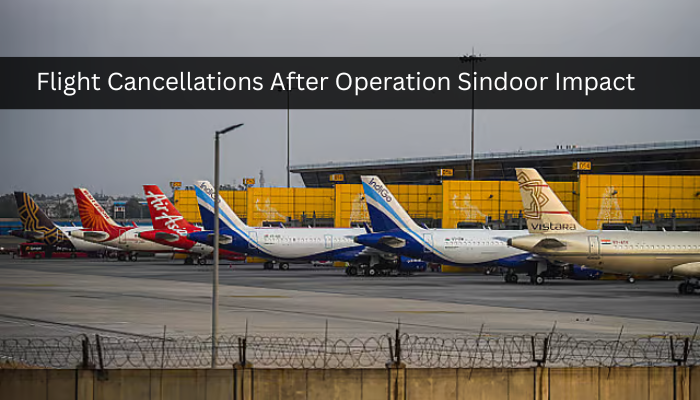Following the announcement of wide-ranging flight cancellations and diversions, shares of IndiGo and SpiceJet, which are two of the largest Indian airlines, fell sharply on May 7. Code-named ‘Operation Sindoor,’ the secret operation instantly affected civilian and defense air operations in north and west India.
Operation Sindoor and Its Immediate Impact
The Indian government has issued a preventive ban on civil flights passing over nearly 16 airports. These airports are located along the border and within high-security zones and include Leh, Thoise, Srinagar, Jammu, Amritsar, Pathankot, Chandigarh, Jodhpur, Jaisalmer, Jamnagar, Bhatinda, Bhuj, Dharamshala, Shimla, Rajkot, and Porbandar airports.
Airline Response: IndiGo and SpiceJet Adjust Operations

The government announcement, IndiGo and SpiceJet immediately released statements from their respective websites and social media outlets. The airline stated that being one of the major low-cost carriers in India, flights would be suspended to and from some major northern destinations such as Srinagar, Jammu, Amritsar, Leh, Chandigarh, and more, Dharamshala, Bikaner, Jodhpur, Gwalior, Kishangarh, and Rajkot. These flight suspensions will last until May 10.
“Closely watching the situation and further schedule realignments in other sectors could follow. We realize these are sensitive moments, and as always, we are here to assist you,” IndiGo stated in a public notice.
SpiceJet, yet another big airline, also made large-scale cancellations to and from Leh, Srinagar, Jammu, Kangra, Kandla, and Amritsar for May 7. The airline quoted the closure of airports for some time and the continuous military operations as the major reasons for the changes.
Stock Market Reaction to the Aviation Disruptions
The news about the flight suspensions and escalated geopolitical tensions quickly translated into market pressure on the share prices of the affected carriers. According to market experts, possible reasons for this might include future uncertainties about operational flights and possibly a prolonging of airspace closings.
Wider Impact on Civil Aviation and Logistics
With almost 16 airports temporarily withdrawn from normal business, the overall civil aviation network of India was put under significant stress. Passengers flying in or out of affected areas had to either cancel their schedule or arrange alternative transport. The air logistics business, which relies on punctual cargo flights at times, also suffered setbacks.
Government Monitoring and Security Precautions
As per Ministry of Civil Aviation sources, these are temporary steps that are reviewed every day based on the changing security scenario. The Directorate General of Civil Aviation (DGCA) is in regular coordination with defence authorities and the airline operators for the safe and orderly resumption of services.
Security forces have also increased observation and checking at all major checkpoints, not only in air traffic but also railway stations and bus stations along the affected areas. Intelligence reports indicate increased vigilance in areas sharing borders with Pakistan and Jammu & Kashmir.
Passenger Assistance and Refund Policies
IndiGo and SpiceJet have both promised complete support to the affected passengers. Passengers are being given the choice of rebooking their tickets without a charge, or being issued a full refund on cancelled sectors. Customer service centers of both airlines have been directed to give priority to urgent travel inquiries, and helpline numbers are being widely circulated.
Travel advisory updates are regularly being issued to inform passengers of any fresh changes. Passengers booked until May 10 are advised to inquire from the airlines before departing to the airport.
Impact on The Airline Industry Outlook

Industry analysts think that although this perturbation is short-lived, continued instances of cancellations of this sort have long-term implications on customer confidence and top-line growth in the airline industry. It adds to operational expenses through unexpected cancellations without prior notice, logistics complications, and attendant passenger handling. In the long run, airlines might look towards reducing losses during such crisis times by claiming compensation or policy relief from the administration.
The wider issue is geopolitical stability and how it affects civil infrastructure, trade, and tourism. The airlines are now inserting more contingency planning and stress testing risk scenarios to try to be better prepared for similar incidents in the future.
Conclusion
Effects of Operation Sindoor have found their way into several sectors; among those, civil aviation was most directly affected. There have been substantial inconveniences to travel schedules, with shutdowns of major airports and cancellations of flights by major airlines. These incidents have caused brief financial losses to the aviation industry. Other updates may be expected given that the military operation is still underway and the security situation is sensitive.
Investors, travelers, and industry players are closely monitoring the situation, wishing for a rapid return to order. In the meantime, IndiGo and SpiceJet are busy trying to avoid disruption and aid impacted customers at this time of uncertainty.
Also Read : Swiggy Shuts Down Private Label Business, Kouzina Takes Over Licensing
Frequently Asked Question
1. Why were IndiGo and SpiceJet flights cancelled on May 7, 2025?
Both the airlines had to cancel several flights following Indian military strikes on terrorist groups in Pakistan under Operation Sindoor. The government shut down 16 major airports in North and West India temporarily on grounds of security, disrupting flight operations.
2. Which airports were closed as a result of Operation Sindoor?
The following 16 airports were shut down for civilian travel on May 7:
Leh, Thoise, Srinagar, Jammu, Amritsar, Pathankot, Chandigarh, Jodhpur, Jaisalmer, Jamnagar, Bhatinda, Bhuj, Dharamshala, Shimla, Rajkot, and Porbandar.
3. How long will the flight cancellations continue?
According to the latest statement of IndiGo, flights to and from affected airports like Srinagar, Jammu, Amritsar, and others have been cancelled until May 10, subject to further updates based on the situation.
4. How are airlines helping affected passengers?
Airlines such as IndiGo and SpiceJet are providing aid through their customer support and official social media accounts. They are likely to offer:
- Refunds or rescheduling
- Live updates regarding resumed operations
- Help with alternate arrangements if possible
5. Is it safe to book flights to North India this week?
Travelers should steer clear of unnecessary trips to the north and west of India until May 10 or until airport services are officially reinstated.










